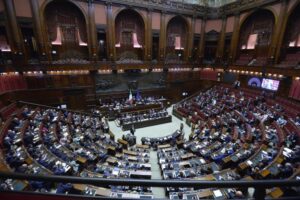La stroncatura di Napolitano sul Fatto: il ricordo di un Presidente poco amato

Il Presidente della Repubblica Giorgio Napolitano e il presidente del Consiglio dimissionario Mario Monti a Roma, l' 8 gennaio 2013. ANSA/ MASSIMO PERCOSSI
Giorgio Napolitano, the former President of Italy who recently passed away, was never liked by Marco Travaglio, the director of Il Fatto Quotidiano, to put it mildly. And his opinion of Napolitano hasn’t changed even after his death. In a long editorial, Travaglio criticizes Napolitano’s political career, claiming that he never got anything right. Let’s take a quick look at his analysis.
According to Travaglio, Napolitano was a fascist until the Liberation and then became a communist. In 1956, he praised the Red Army for suppressing the Budapest uprising with bloodshed. Years later, still during the era of the Italian Communist Party (PCI), Napolitano participated in the expulsion of dissidents who criticized the invasion of Czechoslovakia. He then became the “favorite communist” of Kissinger and Fininvest. As the leader of the right-wing faction of the PCI, he waged war against Berlinguer, who dared to raise the “moral question” and called Craxi a “gangster”.
Travaglio argues that Napolitano always defended the established powers against any threats. As the President of the Chamber of Deputies from 1992 to 1994, he supported the assault of the untouchables during the Mani Pulite (Clean Hands) investigation. In his first term as President, Napolitano declared war on all the magistrates investigating the government. Travaglio mentions several names, including Woodcock, De Magistris, Robledo, Forleo, and the prosecutors in Palermo who uncovered the State-Mafia negotiations. However, the Supreme Court later acquitted the main defendants in that case.
Travaglio also criticizes Napolitano for his close relationship with Berlusconi. He accuses Napolitano of supporting Berlusconi’s government and signing all the controversial laws, except the Englaro decree. Travaglio claims that Napolitano only turned against Berlusconi when it was demanded by the national and international establishment. He actively worked against the Five Star Movement (M5S) and their potential alliance with the Democratic Party (PD) and Left Ecology Freedom (SEL). Travaglio also blames Napolitano for orchestrating the formation of the Letta government, which excluded the parties that had won the elections.
Lastly, Travaglio accuses Napolitano of undermining leaders of his own party, the PD, including Walter Veltroni and Matteo Renzi. According to Travaglio, Napolitano pushed Renzi to focus on constitutional reform, which would further centralize power, as demanded by Italian and international financial powers. This, according to Travaglio, marked the beginning of the end for Renzi’s political success.
In conclusion, Travaglio’s critique of Napolitano’s political career is harsh and leaves no room for praise. He believes that Napolitano consistently defended the powers that be and made questionable decisions throughout his career.











